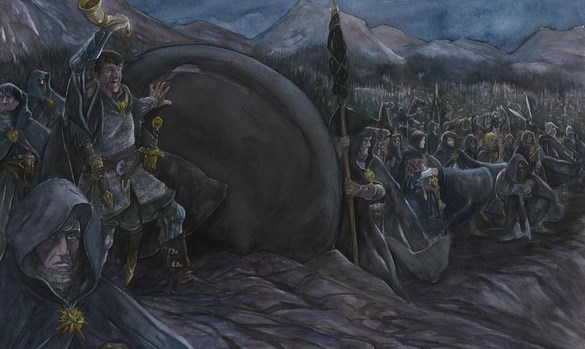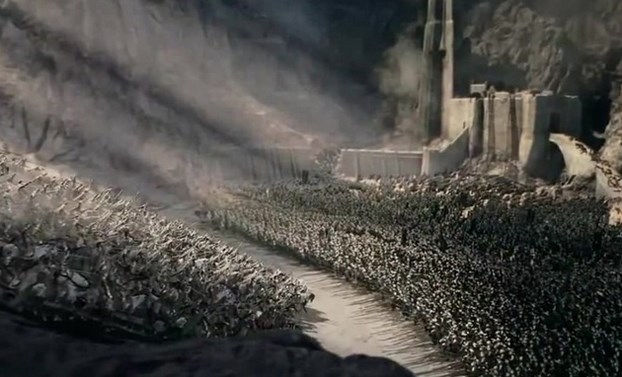Aragorn was known as Strider, a Ranger who lived in the Wild protecting the peoples of Middle-earth. But he was descended from the ancient line of kings, and when he joined the quest of the Ringbearer, the time came for him to fulfill his destiny. As Frodo Baggins struggled to reach Mount Doom, Aragorn fought the servants of the Enemy and revealed himself to Sauron as Isildur’s Heir. After Sauron’s downfall, the Kingdoms of Gondor and Arnor were reunited under Aragorn’s reign and peace and prosperity returned to Middle-earth.
Aragorn was a direct descendant of Isildur, son of Elendil. The Heirs of Isildur were the Kings of Arnor until that kingdom was divided in three in the year 861 of the Third Age. The line was then continued first by the Kings of Arthedain and then, when that kingdom was decimated by war and plague, by the Chieftains of the Dunedain.
The next day, Aragorn first met Arwen who had returned to Rivendell from Lothlorien to visit her father Elrond. When Aragorn saw Arwen he called her Tinuviel, for her beauty was reminiscent of Luthien Tinuviel, an Elf who gave up her immortality for the love of Beren, a Mortal Man.
Also Read:
Aragorn fell in love with Arwen, but Elrond said that if she chose to be with Aragorn she would relinquish her immortality as Luthien had and that his daughter’s age and experience, as well as her lineage, placed her too far above Aragorn. He told Aragorn that many years of trial lay before him.
“Aragorn, Arathorn’s son, Lord of the Dunedain, listen to me! A great doom awaits you, either to rise above the height of all your fathers since the days of Elendil, or to fall into darkness with all that is left of your kin.”
Aragorn left Rivendell and journeyed throughout Middle-earth gaining knowledge and experience and facing many perils. He traveled far east to Rhun and south to Harad and went once into Moria through the Dimrill Gate and even explored the outskirts of Mordor in his efforts to learn about Sauron’s plans. In 2956 he met Gandalf the Grey and they became friends and allies and sometimes traveled together.
Aragorn II:
The meaning of Aragorn is not clearly stated. A note found among J.R.R. Tolkien’s papers at Marquette University suggests that “kingly valor” may have been the intended meaning.
and his father gave him the name Aragorn, a name used in the House of the Chieftains. But Ivorwen at his naming stood by, and said “Kingly Valour” (for so that name is interpreted): “that he shall have, but I see on his breast a green stone, and from that his true name shall come and his chief renown: for he shall be a healer and a renewer.”
The History of Middle-earth, vol. XII, The Peoples of Middle-earth: Foreword, p. xii
The element aran derives from aran meaning “king.” The second element is less certain. In the Etymologies, the ending -on is defined as “valour” while the word gorn is defined as “impetuous.” Thus “impetuous king” is another possible interpretation of Aragorn, though it does not seem to suit the nature of the character.
Estel: Elrond gave the name Estel to Aragorn when he accepted the boy as his foster son in 2933. The name means “hope.”
Chieftain of the Dúnedain: Aragorn became the Chieftain of the Dunedain on his father’s death in 2933. Aragorn was only 2 years old at the time. He was not told of his heritage until 2951 when he was 20 years old.
The Dúnadan: As Chieftain of the Dunedain, Aragorn was called the Dunadan by Bilbo and others at Rivendell. Dunadan means Man of the West or Numenorean.
Isildur’s Heir: Aragorn was a direct descendant of Isildur, son of Elendil. Elendil was the last of the Lords of Andunie of Numenor and the first King of Gondor and Arnor. See the Family Tree of Aragorn below.
Thorongil: Thorongil is the name given to Aragorn by the Men of Gondor while he was in the service of Ecthelion II. It means “Eagle of the Star” and refers to Aragorn’s swiftness and keen sight and the silver star he wore.
Strider: Strider was the name that Aragorn was known by in Bree and the surrounding area because he strode through the countryside on his long legs.
“What his right name is I’ve never heard: but he’s known round here as Strider. Goes about at a great pace on his long shanks; though he don’t tell nobody what cause he has to hurry.”
The Fellowship of the Ring: “At the Sign of the Prancing Pony,” p. 168-9
Although Aragorn said at the Council of Elrond that the appellation “Strider” was “scornful,” this was how he first introduced himself to Frodo and the Hobbits continued to call him Strider, and Aragorn chose the Quenya equivalent Telcontar as the name of his royal house.

